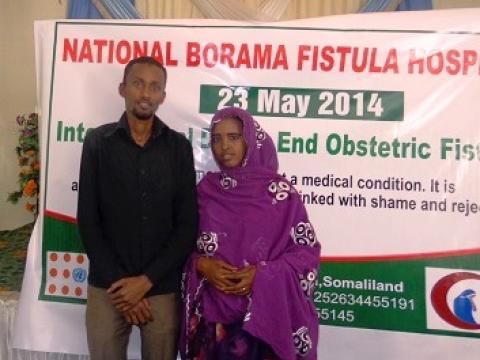Celebrations on International Day to End Obstetric Fistula

Obstetric fistula is a reproductive health condition that silently affects thousands of women across Somalia. The condition is caused by complications during childbirth. It occurs when prolonged labour leads to injuries causing a hole to form between the birth canal and the rectum. The condition is prevalent in places where communities practice harmful traditions such as female genital mutilation (FGM) and early marriage. Lack of and/or inadequate medical care when fistula develops also increase suffering for victims.
Fistula survivors in Borama, Somaliland, were recently joined by government officials, local women group members, representatives of non-governmental organizations (NGOs) including World Vision, hospital staff, and local leaders to mark the International day to end obstetric fistula.
The Borama National Fistula Hospital with the support of UNFPA organized the event on May 24th, 2014. World Vision has been a key partner of the fistula treatment programme. Those attending the event marched together symbolically from RAYS Hotel to the National Fistula Hospital to visit and support Fistula patients.
During the event, the hospital director thanked World Vision for their continued support noting that joint mobilization in remote areas had caused a decline in Fistula cases in Baki and Lughaya areas.
Representing World Vision, Abdirahman Sheikh Mouse Osman, who coordinates the Baki Area Rehabilitation Program (ARP) reiterated the organization’s commitment in to continue supporting the community, especially vulnerable children and women.
Hibo, a Fistula survivor, spoke of her experience with Fistula and how corrective surgery at the National Borama Fistula Hospital in 2008 enabled her to fully recover. "When I suffered from fistula, I could not attend the school, play or interact with my friends, because the fistula problem caused me to live a very isolated life. Today, I am fistula free and I can interact with other people without fearing separation or discrimination" says Hibo.
She spoke on behalf of Fistula survivors and patients highlighting the different challenges that Fistula victims face.
Although no official statistics exist, fistula affects thousands of women across Somalia where contributing factors including FGM and early marriage are rampant.
Hibo opted to stay at the hospital after her recovery and began to learn English and soon after joined the Amoud Nursing School in Borama, studying midwifery. Today, Hibo works at the National Borama Fistula Hospital, and supports other girls and women who are suffering from Fistula. “World Vision has been a channel of hope for mothers and girls by supporting and treating Fistula”, says Hibo.
World Vision continues to provide fistula patients with surgical services as well as counseling and livelihoods support. Our desire is to complete building the ward this year and set up a vegetable garden that will provide food for Fistula patients as they are being treated.